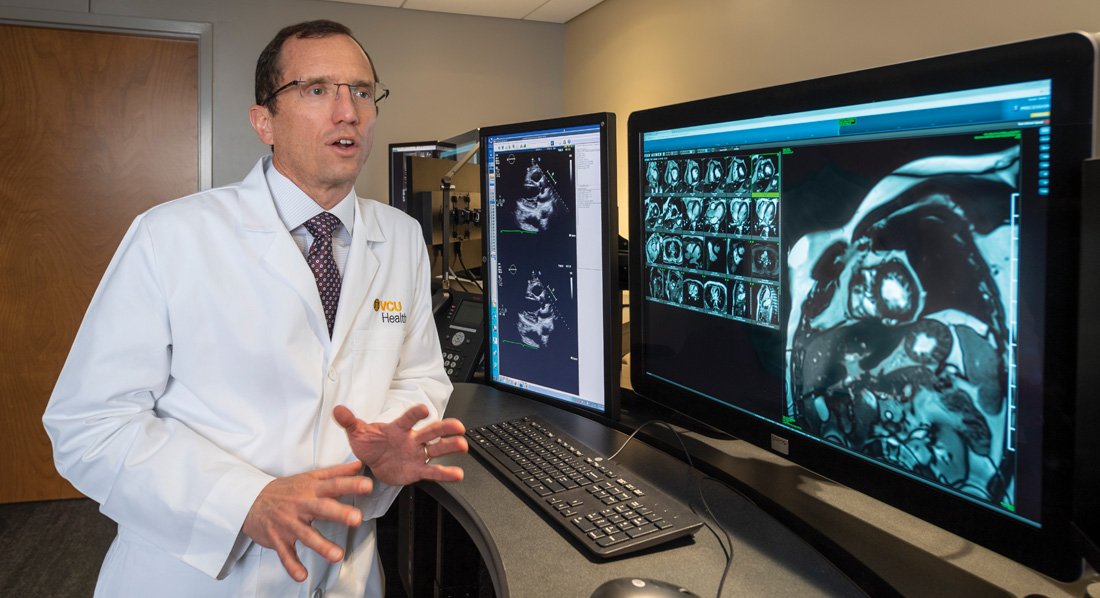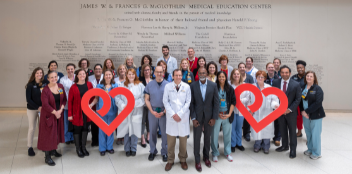A Look at VCU’s Cardio-Oncology Research

VCU Pauley Heart Center’s Director Dr. Greg Hundley is a leader in using magnetic resonance imaging (MRI) to identify early, preclinical signs of heart disease in patients undergoing chemotherapy. Since his arrival, Hundley has been building Pauley’s cardio-oncology team and working with researchers from diverse backgrounds. Here are some of the
exciting explorations in the field:
The Understanding and Predicting Breast Cancer Events After Treatment (UPBEAT) trial is a national study funded by a $3.2 million grant from the National Cancer Institute (NCI). The multicenter trial seeks to understand and predict fatigue, cardiovascular decline and events after breast cancer treatment. The study is looking at 1,000 women, including 840 patients with stage 1-3, nonmetastatic cancer and 160 healthy women.
Hundley is the national principal investigator (PI) for the trial; Director of the Cardiovascular MR Imaging Core Lab, Dr. Jennifer Jordan, is its national imaging director. Dr. Mary Helen Hackney, medical oncologist and member of the Developmental Therapeutics research program at Massey Cancer Center is the PI for VCU. Clinical Research Nurse Coordinator Laura Johnson follows patients in the VCU study, ensuring that the UPBEAT protocol requirements are met.
Participants undergo a cardiac MRI and other testing to get a baseline of their cardiovascular and neurocognitive health, then receive follow-up testing. If any cardiac disease develops, it can be identified and treated early on. The longitudinal study will follow the patients for 9-11 years.
“Once we have all of this information, we’ll have a better picture of the cardiovascular health of these breast cancer patients before and after chemo, and we can use that information to develop new studies and interventions,” said Johnson.
Dr. Alex Lucas, an instructor with Pauley and the Department of Health Behavior and Policy, is leading a feasibility study through which he hopes to establish VCU as a site for a large NCI-funded trial led by Hundley and Jordan. Lucas is initiating aerobic exercise programs in patients with stage 2 and above lymphoma to see if it will help prevent heart disease.
Participants undergo a cardiac MRI and other testing to get a baseline of their cardiovascular and neurocognitive health, then receive follow-up testing.
Lymphoma patients typically receive anthracyline-based chemotherapy, a regimen known for its cardiotoxicity. “We’re trying to catch them as they begin their chemotherapy. We don’t want to wait until those drugs have had negative side effects before we do something about it,” said Lucas.
Baseline testing of the patients in the study involves a graded exercise evaluation on a treadmill to measure exercise capacity, followed by a cardiac MRI to evaluate heart function. The patients are slowly moved up in their exercise plans and undergo retesting at three and six months.
While many doctors recommend rest following chemotherapy, this trial goes in a new direction by encouraging patients to exercise.
A similar evolution occurred in cardiovascular rehabilitation, said Lucas. “Thirty years ago, if you had a heart attack, you would have been recommended bed rest until you recovered. We now know that the best thing to do is to start moving and to become physically active as soon as you can.”
Another study is being led by Dr. Vanessa Sheppard, chair of the Department of Health Behavior and Policy and the Theresa A. Thomas Memorial Chair in Cancer Prevention and Control at Massey Cancer Center, and her team is assessing the impact of exercise in breast cancer survivors. Their pilot study introduces exercise and nutritional interventions to African American breast cancer survivors, a demographic noted for high rates of obesity and low rates of physical activity.
Sheppard is hoping to find answers to the racial disparity and “better understand factors that may explain this lower level of physical activity in order to inform interventions that could help prevent the onset and/or worsening of comorbidities such as cardiovascular disease.”
Back to Autumn-2019
Join our Pauley Consortium composed of patients, friends and advocates.

